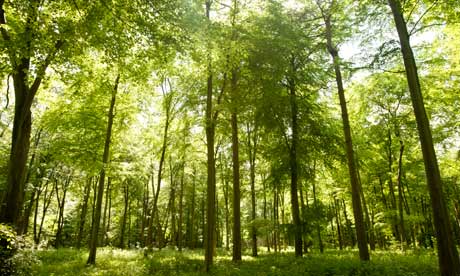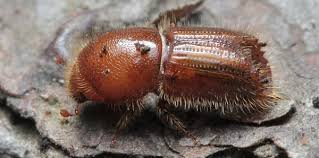George Wuerthner is the Ecological Projects Director for the Foundation for Deep Ecology. He is an ecologist and wildlands activist. He has published 38 books on environmental issues and natural history including such environmentally focused books as Welfare Ranching, Wildfire, Thrillcraft, Energy and most recently Protecting the Wild. Today we talk about beetles. The timber industry and the Forest Service portray beetles as a threat to forests, and as yet another reason forests must be cut down. Wuerthner discusses beetles as keystone species, important to forests, and to those who live in them.
Interview with Heather Forest and Larry Foglia, founders of the Long Island Community Agriculture Network – 10.08.15
Heather Forest and Larry Foglia are two of the founders of The Long Island Community Agriculture Network and were instrumental in building the Gateway Community Garden in Huntington Station. They are co-owners of Fox Hollow Farm, a small family farm in Huntington Station where they managed a CSA for 100 families, conduct agricultural education programs, and have been engaged in vegetable farming for over 35 years.
Heather Forest, Ph.D., is a storyteller, author, musician, and organic vegetable farmer. Since 1975, she has been Executive Director of Story Arts Inc., a Huntington NY based, not-for-profit cultural arts organization that is dedicated to the art of storytelling and to its educational applications. She is one of the founders of LICAN, the Long Island Community Agricultural Network and co-owner of Fox Hollow Farm Inc. of Huntington Station, NY, an agricultural enterprise that includes a CSA serving 100 families and which offers educational programs focused on food equity, organic gardening, and farming skills. Heather holds a master’s degree in storytelling from East Tennessee State University and a Ph.D. in Leadership and Change from Antioch University.
Lawrence P. Foglia, M.S., is a farmer, natural resource consultant and environmental educator who, for the past 35 years, has worked to nurture, preserve and protect the natural world. As a Natural Resource Consultant he has been a project manager affiliated with both the Peconic and Nassau Land Trusts working to preserve and protect farms, farming and natural open space on Long Island. A founding member of LICAN, the Long Island Agriculture Network, he has been instrumental in helping to establish and build the Gateway Community Garden in Huntington Station, NY. He is founder and co-owner of Fox Hollow Farm Inc., a Huntington Station enterprise that provides land preservation consulting, has a CSA that serves 100 families, and offers educational programs on gardening and farming skills. He holds a master’s degree in Natural Resources from the Ohio State University.
Reynard Loki – The GOP’s Shocking Attack on America’s National Forests
Two Republican bills currently making their way through Congress should anger any American who cares about the nation’s forests. Introduced this summer, both bills are pro-industry and anti-environment — and seek to eliminate the public participation in federal decisions about forest management that could negatively impact local communities, ecological health and wildlife. The first one, HR 2647 [3], the Resilient Federal Forests …
Drought’s lasting impact on forests
SALT LAKE CITY, July 30, 2015 – In the virtual worlds of climate modeling, forests and other vegetation are assumed to bounce back quickly from extreme drought. But that assumption is far off the mark, according to a new study of drought impacts at forest sites worldwide. Living trees took an average of two to four years to recover and …
Alex Hutchinson – How Trees Calm Us Down
In 1984, a researcher named Roger Ulrich noticed a curious pattern among patients who were recovering from gallbladder surgery at a suburban hospital in Pennsylvania. Those who had been given rooms overlooking a small stand of deciduous trees were being discharged almost a day sooner, on average, than those in otherwise identical rooms whose windows faced a wall. The results …
From Watersheds to Mountains, What If We Based Our Borders on Nature?
There’s little natural about the boundaries that divide states and countries. They’re often imaginary lines that result from history, conflict, or negotiation. But imagine what the world would look like if borders were set according to ecological and cultural boundaries. Bioregionalism says that’s the only logical way to divide up territory: Let watersheds, mountain ranges, microclimates, and the local knowledge …
The Fate of Trees: How Climate Change May Alter Forests Worldwide
In May 2011, a postdoctoral student at Los Alamos National Laboratory named Park Williams set out to predict the future of the dominant iconic conifers of the American Southwest — the Douglas fir, the piñon pine and the ponderosa pine. As the planet warms, the Southwest is projected to dry out and heat up unusually fast — few places will be more …
Bark Beetles Are Decimating Our Forests. That Might Actually Be a Good Thing.
There is an eerie feel to this grove of lodgepole pines that I can’t quite put my finger on as entomologist Diana Six tromps ahead of me, hatchet in hand, scanning the southwestern Montana woods for her target. But as she digs the blade into a towering trunk, it finally hits me: the smell. There’s no scent of pine needles, no sharp, …
- Page 2 of 2
- 1
- 2








